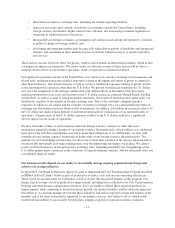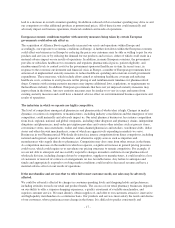Walgreens 2015 Annual Report Download - page 25
Download and view the complete annual report
Please find page 25 of the 2015 Walgreens annual report below. You can navigate through the pages in the report by either clicking on the pages listed below, or by using the keyword search tool below to find specific information within the annual report.Changes in healthcare regulatory environments may adversely affect our businesses.
Political, economic and regulatory influences are subjecting the healthcare industry to significant changes that
could adversely affect our results of operations. In recent years, the healthcare industry has undergone significant
changes in an effort to reduce costs and government spending. These changes include an increased reliance on
managed care; cuts in certain Medicare and Medicaid funding in the United States and the funding of
governmental payers in foreign jurisdictions; consolidation of competitors, suppliers and other market
participants; and the development of large, sophisticated purchasing groups. We expect the healthcare industry to
continue to change significantly in the future. Some of these potential changes, such as a reduction in
governmental funding at the state or federal level for certain healthcare services or adverse changes in legislation
or regulations governing prescription drug pricing, healthcare services or mandated benefits, may cause
customers to reduce the amount of our products and services they purchase or the price they are willing to pay for
our products and services. We expect continued governmental and private payer pressure to reduce
pharmaceutical pricing. Changes in pharmaceutical manufacturers’ pricing or distribution policies could also
significantly reduce our profitability.
The ACA was enacted in 2010 to provide health insurance coverage to millions of previously uninsured
Americans through a combination of insurance market reforms, an expansion of Medicaid, subsidies and health
insurance mandates. While certain provisions of the ACA have already taken effect, others have delayed
effective dates or require further rulemaking action or regulatory guidance by governmental agencies to
implement and/or finalize. As a result, there remains considerable uncertainty as to the full impact of ACA on
our business operations. Future rulemaking or other regulatory actions under the ACA or otherwise could
increase regulation of pharmacy services, result in changes to pharmacy reimbursement rates, and otherwise
change the way we do business. We cannot predict the timing or impact of any future rulemaking or other
regulatory actions, but any such actions could have a material adverse impact on our results of operations.
A significant change in, or noncompliance with, governmental regulations and other legal requirements
could have a material adverse effect on our reputation and profitability.
We operate in a complex, highly regulated environment in the United States and in the other countries in which
we operate and could be adversely affected by changes to existing legal requirements, new legal requirements
and/or any failure to comply with applicable regulations. Businesses in our Pharmaceutical Wholesale division
are subject to a range of regulations relating to such things as product margins, product traceability and the
conditions under which products must be stored. Our retail pharmacy and health and wellness services businesses
are subject to numerous country, state and local regulations including licensing and other requirements for
pharmacies and reimbursement arrangements. The regulations to which we are subject include, but are not
limited to: country, and state registration and regulation of pharmacies; dispensing and sale of controlled
substances and products containing pseudoephedrine; applicable governmental payer regulations including
Medicare and Medicaid; data privacy and security laws and regulations including HIPAA; the ACA; laws and
regulations relating to the protection of the environment and health and safety matters, including those governing
exposure to, and the management and disposal of, hazardous substances; regulations regarding food and drug
safety including those of the U.S. Food and Drug Administration (“FDA”) and Drug Enforcement Administration
(“DEA”), trade regulations including those of the U.S. Federal Trade Commission, and consumer protection and
safety regulations including those of the Consumer Product Safety Commission, as well as state regulatory
authorities, governing the availability, sale, advertisement and promotion of products we sell; anti-kickback laws;
false claims laws; laws against the corporate practice of medicine; and foreign, national and state laws governing
the practice of the profession of pharmacy. For example, in the United States the DEA, FDA and various other
regulatory authorities regulate the distribution and dispensing of pharmaceuticals and controlled substances. We
are required to hold valid DEA and state-level licenses, meet various security and operating standards and
comply with the Controlled Substance Act and its accompanying regulations governing the sale, dispensing,
disposal, holding and distribution of controlled substances. The DEA, FDA and state regulatory authorities have
broad enforcement powers, including the ability to seize or recall products and impose significant criminal, civil
-21-
























